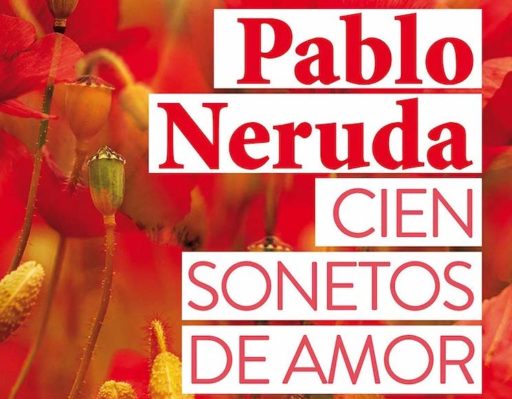Right in the middle of Pablo Neruda’s Sonnet 54, which is itself in the middle of his Cien sonetas de amor, his 100 Love Sonnets, is this incredibly evocative line:
Razón y amor desnudos viven en esta casa.
Which translates:
Reason and love live naked in this house.
Living naked together in a house is an image from a younger time in my life. Always potentially erotic, it is an image, too, of an almost unbearable honesty: there’s no hiding under clothes, nothing that can’t be seen, no protection. It’s utter vulnerability. And I would say that it seems very much to be an image jumping out of a young poet’s imagination except for who is personified as living naked in this house: reason and love. A surprising pair. Importantly, these aren’t the typical youthful lovers. For the young, aren’t love and reason usually on opposing sides? Isn’t that what all of those romantic comedies are about, about love overcoming reason? About the triumph of falling in love over perfectly rational reasons not to?
The poem begins with reason, but it isn’t cold, this reason, not calculating. It is clear:
Splendid reason, spirited clarity of the absolute cluster, of the upright noon, here we are at the end, without loneliness and alone, far from the delirium of the savage city.
I think that reason is a hard thing for many young people, because it is difficult to learn and because it spares nothing in the scope of its deliberations or in the consequences of its deductions. It’s too much for a young mind to handle, and what slow progress you make trying to master some small portion of it inevitably fails to account for something. I suppose that’s why love often appears to be a combatant in this battle to get the better of thinking, because isn’t that how it always happens in the movies, just when the hero and heroine have it all figured out, they fall in love and realize that they don’t have anything figured out at all?
But the poet writing this sonnet has been around the block a few times, and reason isn’t like the concentrated light of a laser beam anymore, it’s the light of “upright noon.” It’s fruitful, like an “absolute cluster” (of grapes, perhaps). It isn’t cloistered in a lab, but is met in solitude, far from a city that isn’t the image of culture, but of “delerium.” For young people who spend their days in frustrating apprenticeship to reason, this is the fruit in older age of a clearer vision.
But reason is not alone here, and we meet love in the second stanza:
When the pure line surrounds her dove and the fire decorates peace with his food you and I we build this celestial result. Reason and love live naked in this house.
What reason and love build is celestial. If reason is a “pure line” that has been shaped and honed over a life, it won’t be too narrowly conceived, or too rigid, or in some way removed from reality anymore. It will have matured. So we see it in the poem as a line that “surrounds her dove,” weaving a nest from the fibers it has accumulated on its travels that can offer rest and home to the fragile flying creature it courts. If love burns like fire, it is not the fire that burns villages or sows panic, but the fire that is kindled in peace, that can fill the house with its bread. A house where reason and love live naked together.
Kierkegaard famously said that love stories end in the wrong place, at the wedding which should be the beginning of the story instead of the end. Maybe he isn’t right about that. Maybe the stories end where poetry ought properly to take over. The falling in love that seems so irrational and makes such great stories is a love that starts you walking down a road. You are walking with someone, and you are walking in the same direction. But of course, reason catches up with you. And if you have apprenticed yourself well enough to it, it will illuminate, eventually, where that road is going. I wonder if we distrust reason sometimes not because it interferes with love, but because it reveals to us where our love is taking us. Maybe, as we get older, we curse a love that felt more powerful than reason when we have reason enough to see where it’s going.
Because, let’s face it: there’s really only one place that love leads. It’s a place that will demand in some way or other that I give up what I hold onto most tightly as my own, as my self. I’m going to have to give up that thing I don’t want to share. It’s why that image of reason and love living naked in a house isn’t actually a youthful one, even if it might appear to be at first blush. It’s an image made by an old poet who knows that living naked in a house means that if there’s some piece of myself that I don’t want my lover to see, I have to cut it out of myself. I have to get rid of it. There’s no hiding it anymore.
And it’s a poet’s house, a poet whose poems are, at their best, naked the way those lovers are. It is an astonishing vision of true love and right reason, and taxing, even to briefly hold it in the mind. And if it is an image of a mature love, does it not also seem fitting for a mature poetry, where the poem is the house where reason and love live, naked together?
Furious dreams, rivers of bitter certainty, decisions more difficult than the dream of a hammer fell into the double cup of the lovers.
Until they were elevated on the balance, twins, the reason and the love like two wings. This is how transparency was constructed.
If there are a thousand ways that we allow what we think are tensions between love and reason to destroy the one or the other, what a miracle it is that the poet has a vision of what is possible when a love and a reason hold together, and remain faithful. The poet says, “This is how transparency was constructed.”
What feels so urgent about this is that yes, it is the transparency of a true love, but it is also the transparency of a true poetry, a poetry born out of love. This vision of the love and the reason centering almost magically in perfect balance on a scale after having traveled a long and treacherous road holds within it the paradox of perfect making just as it does the paradox of perfect loving: in a moment that defies gravity because the balance is no longer weighed down by the one or the other, what was opaque becomes transparent, and we are gifted with vision illuminated by the light Dante sees by in Paradise, that “light intellectual replete with love.”
Anna Key is a poet and Tom Break is a visual artist and writer. Their work together is available at In the Wind Projects.





